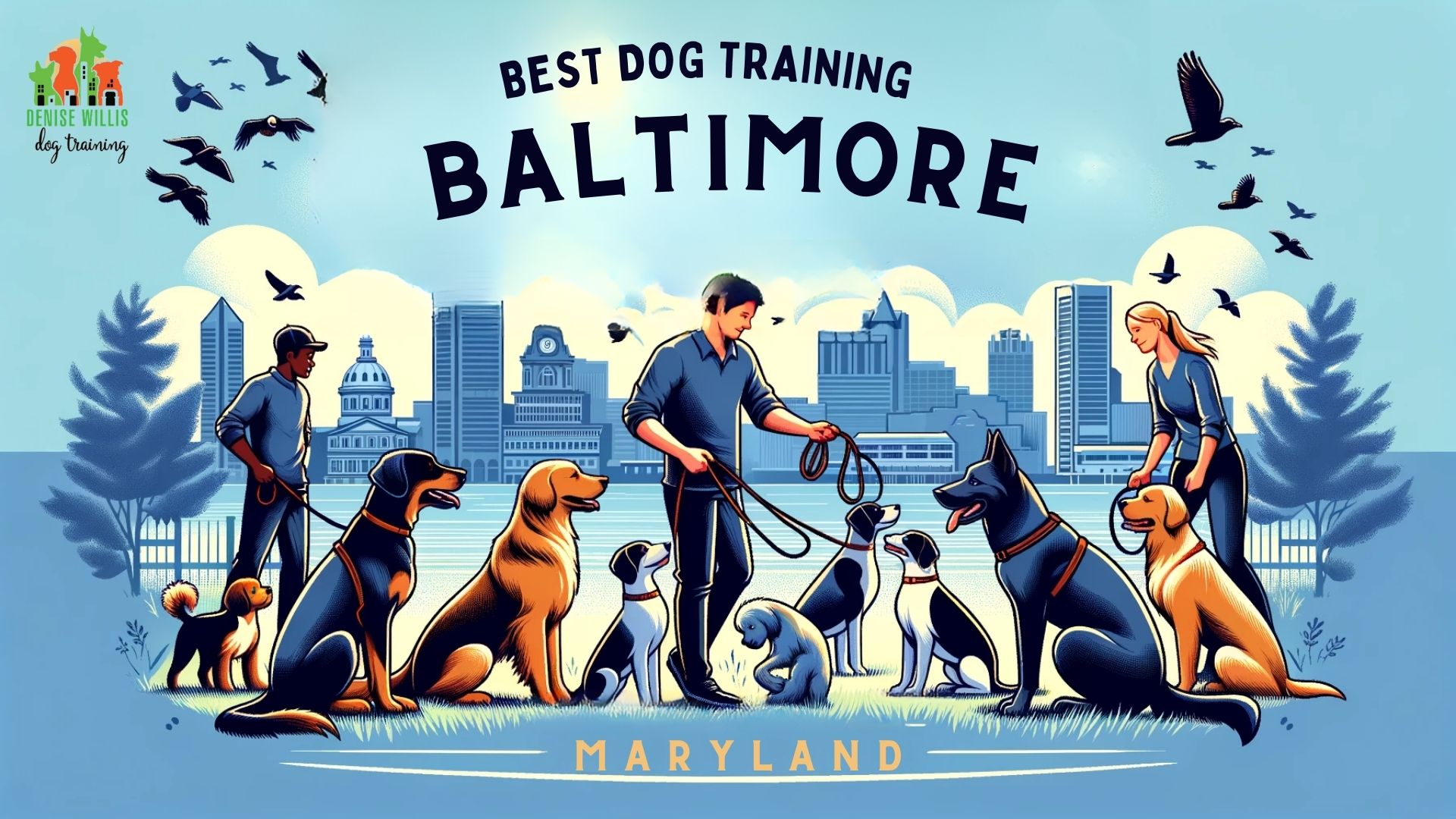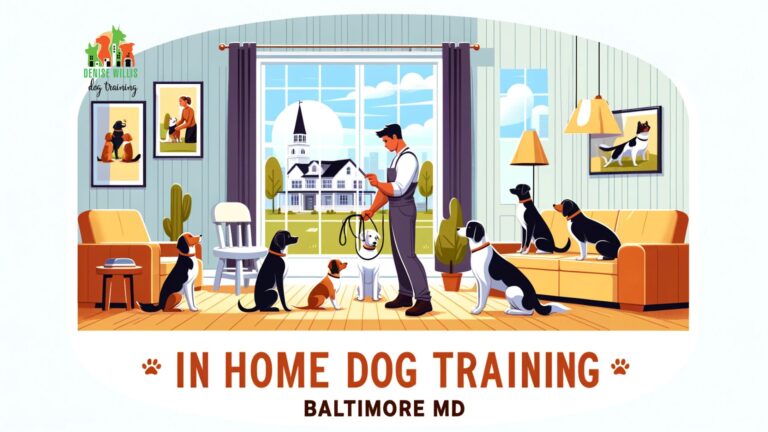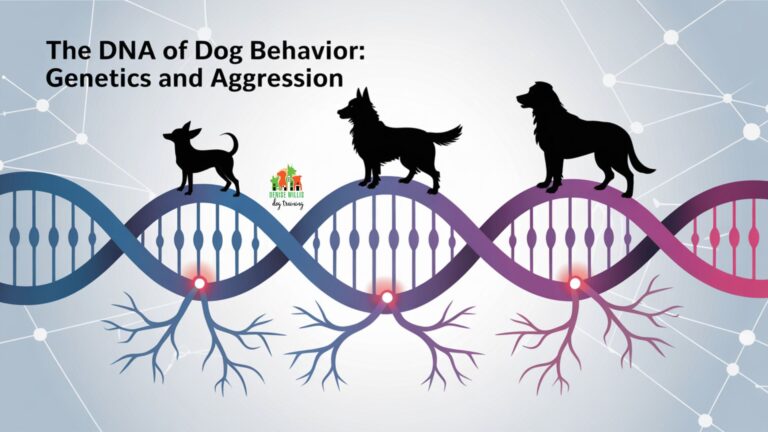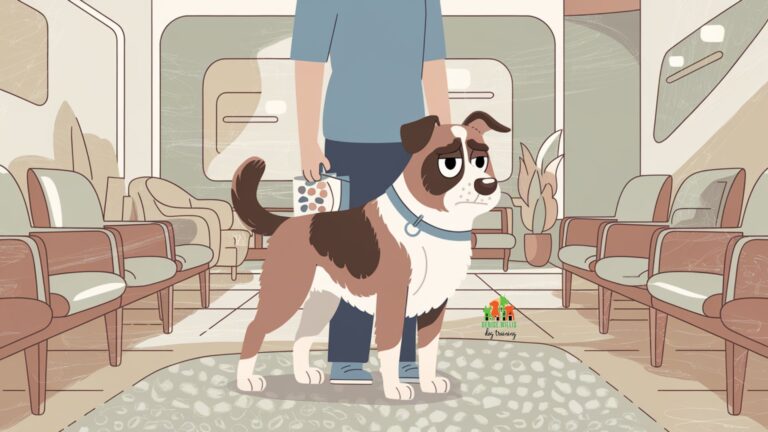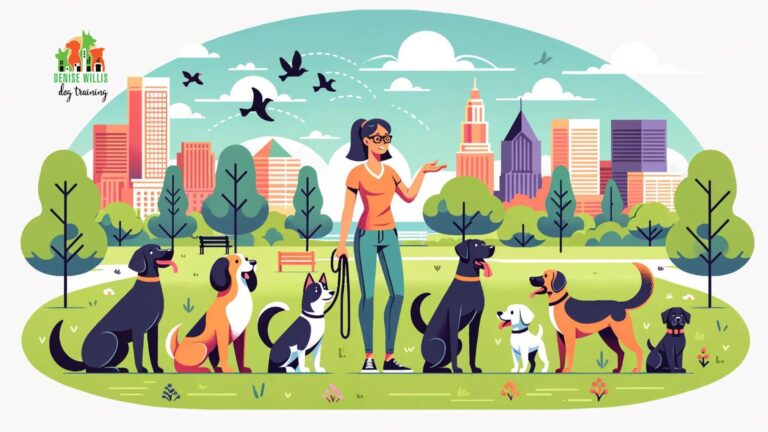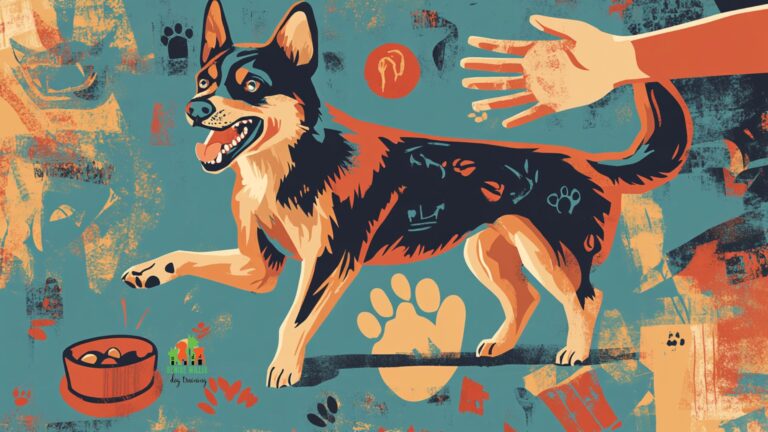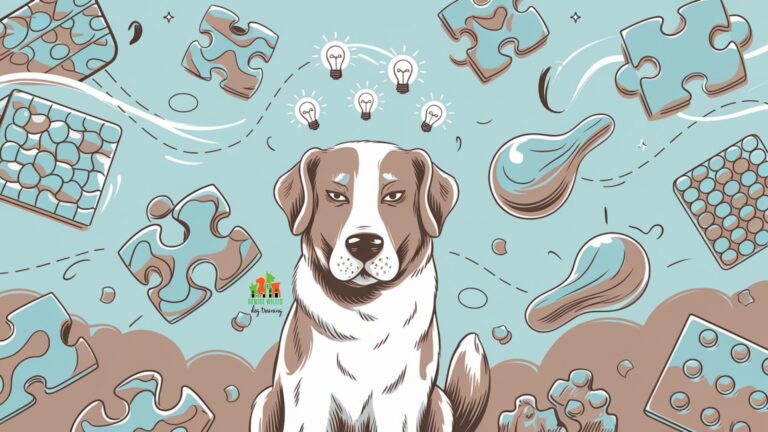Dog Training Baltimore: A Comprehensive Guide for Owners
📍 Service Area Notice: DW Dog Training provides in-person training services exclusively in the Greater Baltimore area. While our blog content is designed to help dog owners internationally, our hands-on training services are locally focused. For readers outside our service area, we hope you find value in our articles and welcome you to reach out with questions!
Dog training is an essential part of responsible pet ownership. While some basic behaviors can be taught at home, most owners benefit from professional guidance to fully train their dogs. Proper training establishes rules and boundaries, enhances communication, resolves behavior issues, and improves the bond between owner and dog.
This comprehensive guide will provide dog owners in Baltimore with key information on the city’s top obedience programs, behavior modification services, specialized instruction, and leading training companies. We’ll also cover when to start working with dogs, signs that additional training is needed, methods and credentials to look for in professionals, and more.
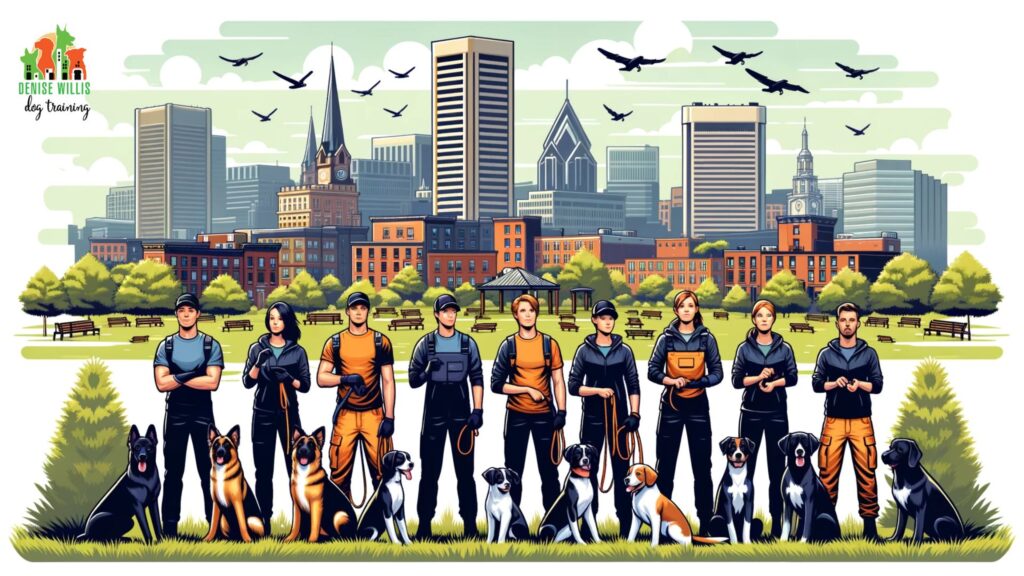
Key Takeaways
- DW Dog Training offers customized dog training services in the Baltimore area to help establish obedience, curb problematic behaviors, and create strong bonds between pets and owners.
- Our training philosophy centers on “Better Relationships Through Better Communication,” clearly establishing expectations so dogs understand how to be mannerly and obedient.
- Group or in-home private lessons teach fundamentals like leash manners, basic commands, proper greetings, anxiety/aggression management, and more.
- Denise Willis and her team of professional trainers have over 20 years of experience modifying all types of problem behaviors using positive, reward-based techniques.
- Hundreds of local clients have seen great improvement in their dogs thanks to DW Dog Training’s effective, tailored programs.
- Training options range from one-on-one at-home sessions to immersive “board and train” programs where dogs stay with Denise for intensive daily training.
- DW Dog Training prides itself on safety, transparency, accountability, and communication, and continues to support through lifetime access to trainers even after the term of face-to-face lessons.
- With over 150 delighted 5-star Google reviews and competitive pricing, DW Dog Training is considered the top choice for dog obedience services in the greater Baltimore region.
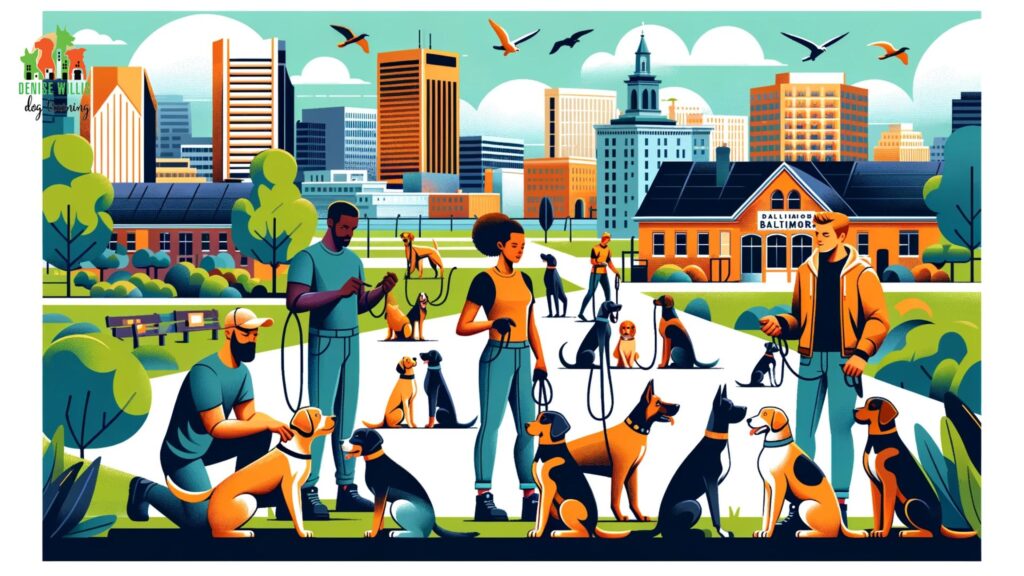
An Overview of Dog Training Services in Baltimore
Baltimore offers a wide variety of dog training options to establish better behavior, manners, skills, and relationships between pets and their people. Common services include:
Basic Obedience Training
This foundational instruction focuses on core commands like sit, stay, come, down, and heel. Lessons provide structure while allowing dogs to better understand what owners expect of them. Training typically begins with puppies and then continues reinforcing those basics with adult dogs.
Owners learn positive techniques to control common issues like leash pulling, barking, jumping up, and more. Group classes provide socialization, while private sessions offer personalized attention.
Behavior Modification for Anxiety, Fear, and Aggression
For dogs struggling with specific behavior problems, training goes beyond basic cues. Separation anxiety, reactivity toward strangers, aggression between household pets, and other entrenched issues often require one-on-one behavior modification plans.
Professional dog trainers or veterinary behaviorists design customized approaches to help anxious, fearful, or aggressive dogs overcome triggers, relax, and choose better behaviors. Medications may also be incorporated for extreme cases.
Specialized Training
Specialized instruction prepares dogs for activities like competition sports (agility, nose work, dock diving) or jobs (service animals, search and rescue, police K9s). Puppy classes focus on early positive exposures and socialization to prevent future issues. Some facilities even offer swimming lessons.
Other options like boarding school intensive training, rehabilitation programs for rescued dogs, and teaching canine good manners classes are also available from certain professional Baltimore dog training businesses.
Choosing the Best Dog Trainer in Baltimore
With so many local trainers and classes, selecting the best fit can feel overwhelming. Observing credentials, methods, pricing, and genuine customer experiences helps owners make informed decisions.
Dog Trainer Credentials
Reputable facilities employ certified trainers with proven experience, education, and aptitude for animal behavior modification. Many advertise key qualifications like:
- CPDT-KA (Certified Professional Dog Trainer-Knowledge Assessed)
- PMCT (Pat Miller Certified Trainer)
- CBCC-KA (Certified Behavior Consultant Canine-Knowledge Assessed)
- ACAAB (Associate Certified Applied Animal Behaviorist)
Dog behaviorists may also have advanced degrees (M.S., Ph.D.) in behavioral science. Staff biographies highlighting competencies offer transparency.
Training Methods and Philosophy
Look for positive reinforcement-based approaches in line with research on animal behavior and welfare. Fear, pain, intimidation, and punishment should never be used.
Facilities serious about rehabilitating fearful, anxious, or aggressive dogs will explain the specifics behind their customized behavior modification programs.
Range of Training Services
Established companies have experience addressing all types of obedience and behavioral issues across various breeds, ages, and backgrounds. They offer flexible options accommodating owners’ budgets, schedules, and unique needs:
- Group puppy preschool
- Ongoing adult dog group classes
- Private in-home lessons
- Board and train
- Reactive rover programs
- Specialty Classes
Getting Answers to Key Questions
Any credible trainer will gladly answer questions about techniques, experience levels, typical timelines, and what owners can expect regarding rates of improvement. Useful things to ask potential trainers include:
- What specific methods do you use? Do you personalize programs?
- How much experience do you have dealing with my dog’s specific problems?
- Beyond the basics, what specialized areas do you focus on?
- How long are group classes or private sessions?
- What credentials, education, and ongoing development do staff have?
- Can I get references from past clients with similar issues?
- What is the price range for your services (group, private, board, and train)?
Being aligned on training philosophy, approaches, and communication style is key to success.
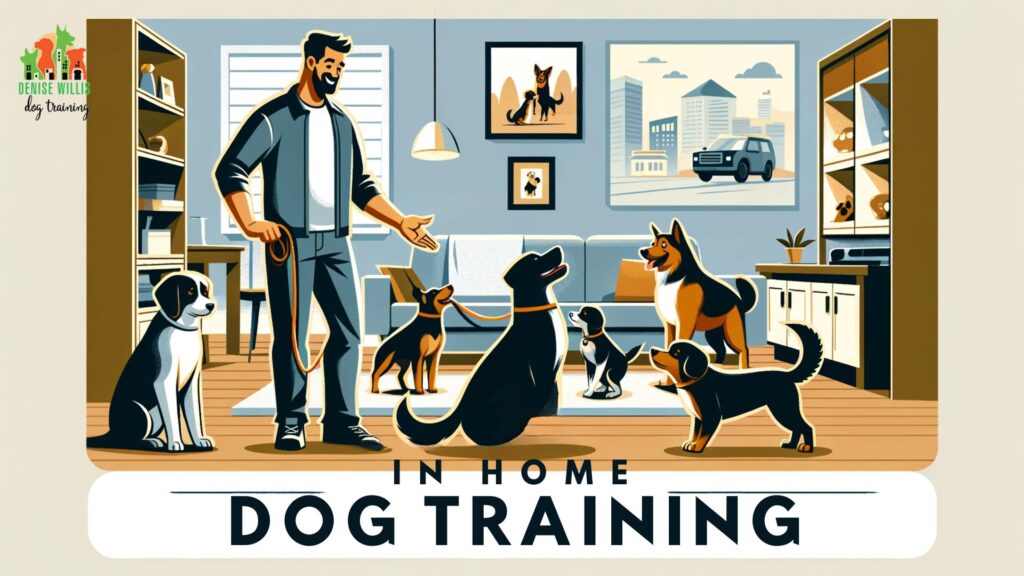
Knowing When to Start Training Dogs
While some basic home training can begin immediately, most Baltimore professionals advise beginning group or private lessons between 16 weeks and 6 months of age. However, certain scenarios call for earlier intervention.
Keys Times for Training Intervention
- As soon as they come home: Simple things like crate training, potty training, name recognition, and socialization to sights and sounds can prevent issues later. Gentle guidance establishes rules and boundaries quickly.
- 8 weeks: Sign puppies up for preschool classes to learn good manners and critical socialization skills from professionals. Early, positive experiences build confidence.
- 16 weeks: Developmental stages and vaccination schedules allow for group class enrollment at this age. Continued structured training teaches focus and skills.
- 6 months: Adolescent rebellion kicks in around this age. Refreshing respectful behaviors before bad habits set in is key.
- Immediately for rescued dogs: Get support adjusting dogs to new environments with unknown histories. Building relationships and trust happens faster with expert trainers.
- Any age for problems: Barking, leash pulling, aggression, separation anxiety, and fear generally require professional intervention ASAP, regardless of the dog’s age. Catching and addressing issues early on is best.
Looking for an expert Baltimore trainer ready at any point to help owners achieve better-behaved dogs? Contact DW Dog Training today!
Signs Your Dog Needs More Formal Training
While some dogs naturally pick up on desired behaviors, others need professional intervention to learn good manners and overcome behavior hurdles. Telltale signs include:
Difficulty With Basic Cues
- Dog fails to respond to known cues like sit, stay, and down more than 25% of the time when moderately distracted
- Frequently pulls on-leash despite halt or directional commands
- Recalls or comes when called less than 50% of the time when off-leash
- Does not eliminate on command or have reasonable housebreaking consistency
Unwanted Behaviors Persist
- Continues regular barking despite efforts to redirect or train quiet cues
- Jumping on owners, guests, or children continues despite corrections
- Destructive chewing, digging, or other self-rewarding activities continue happening
Aggressive Warning Signs
- Growls, cowers, or bites when people approach food dishes or treats
- Shows stiffening, growling, hair raised, whites of eyes, or other warnings before biting over possessions or space
- Attempts to attack or fight other dogs when on-leash
Extreme Fear and Anxiety Behaviors
- Urinates, defecates, pants/shakes/trembles during interactions with people or other animals
- Destructive within seconds of being left alone at home, tries to escape confinement
- Avoids contact with strangers or balks at entering unfamiliar buildings or locations
If your dog exhibits problematic behaviors beyond basic training struggles, the situation warrants greater attention from an accredited trainer or certified behavior consultant. Allowing issues to escalate risks danger to people and animals in and outside the home.
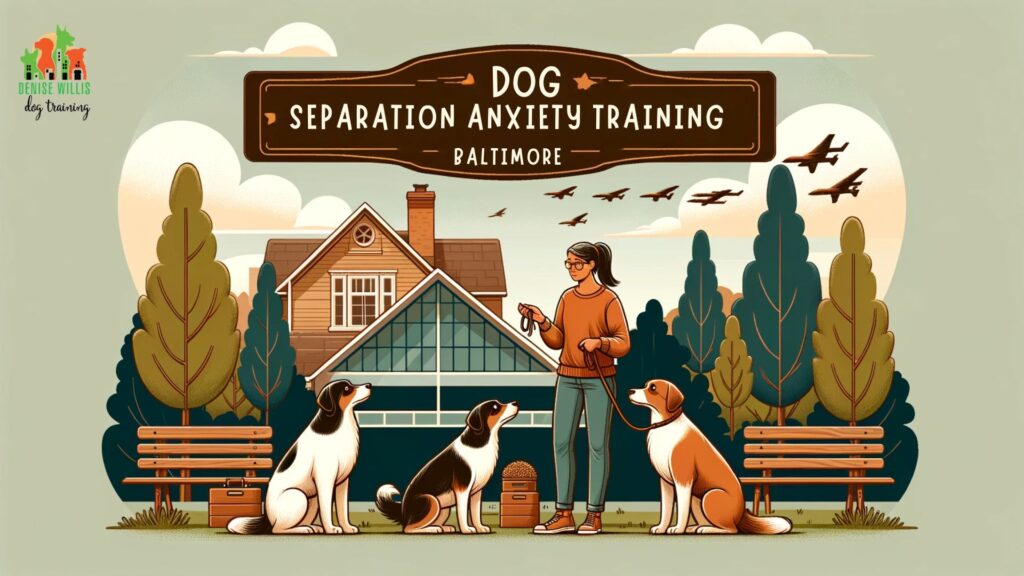
An Overview of Common Dog Training Methods
Various schools of thought exist regarding animal training, some relying on punishment and others focused entirely on reinforcing desired behaviors and relationships.
Aversive Training Methods
Dominance and correction-based methods often incorporate physical punishment like alpha rolls, leash corrections, scolding, and electronic stimulation for undesired behaviors. Research reveals these force-based approaches damage trust and provoke increased aggression in many dogs.
Science-Based Positive Reinforcement Training
Modern, science-supported methods instead identify motivators to reward polite, calm behaviors consistently. As dogs repeat what works to earn food, toys, play, and access to people or locations, unwanted conduct is extinguished naturally.
Known as reward-based, mirror training, or LIMA (Least Intrusive Minimally Aversive) approaches, positive reinforcement techniques teach owners to:
- Correctly observe, anticipate, motivate, and reward desired behavior
- Manage the environment proactively to prevent issues
- Continually reinforce alternate and incompatible positive behaviors instead of punishing unwanted ones
- Foster trusting relationships built on clear communication, patience, and empathy
This reshapes emotional responses and redirects conduct without suppressing natural self-expression long term. It simply focuses more attention on appropriate expressions dogs choose themselves.
DW Dog Training stands behind science-backed positive reinforcement methods for lasting behavioral change and healthy owner-pet relationships. Our certified trainers have used these techniques successfully for over 20 years to resolve all types of obedience problems and aggressive issues.
We help owners better understand how dogs think and what motivates them in order to bring out their pet’s very best. Our effective customized plans address unique root causes of misbehavior instead of merely suppressing symptoms.
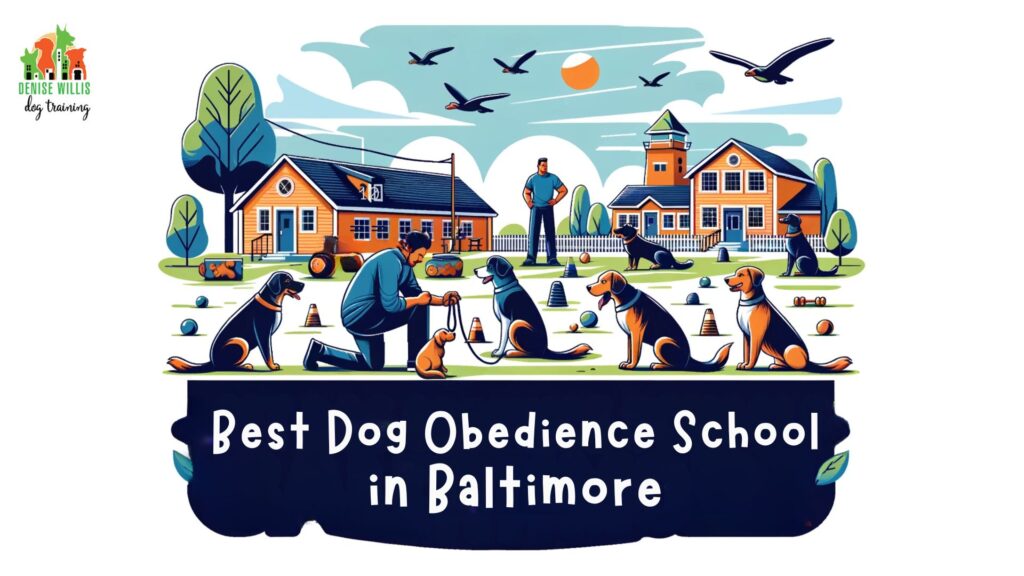
Final Thoughts On Dog Training Baltimore: Reach Out to DW Dog Training Today!
As you can see, DW Dog Training offers a wide variety of services to help you achieve a strong bond and lasting communication with your dog. Their experienced trainers utilize customized approaches to address each dog’s unique needs and temperaments.
Whether you require help with basic obedience, walking politely on a leash, curbing excessive barking, or modifying more serious behavioral issues, our team at DW Dog Training has the skills to transform your relationship for the better.
With affordable group or private training available, there’s an option to fit every Baltimore dog owner’s schedule and budget.
Ready to stop embarrassing leash dragging, chasing, and jumping? Eager to curb annoying barking or housetraining mistakes? Need science-backed solutions for anxiety and aggression problems?
Call 443-429-0445 or contact DW Dog Training today to schedule your consultation. Our “Better Relationships Through Better Communication” approach establishes clear structure and expectations so you can finally enjoy peaceful walks, polite greetings, and shared bonding moments.
Reclaim happy tails and harmonious homes through their customized training programs successfully helping hundreds of local families. See why we have over 150 delighted 5-star reviews. Contact DW Dog Training to get started on your dog’s transformation journey!

